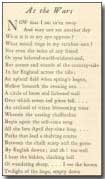Prose & Poetry - The Muse in Arms - At the Wars
 First published in London
in November 1917 and reprinted in February 1918 The Muse in Arms
comprised, in the words of editor E. B. Osborne:
First published in London
in November 1917 and reprinted in February 1918 The Muse in Arms
comprised, in the words of editor E. B. Osborne:
"A collection of war poems, for the most part written in the field of action, by seamen, soldiers, and flying men who are serving, or have served, in the Great War".
Below is one of seven poems featured within The Mother Land section of the collection.
You can access other poems within the section via the sidebar to the right.
At the Wars
by Robert Nichols
Now that I am ta'en away
And may not see another day
What is it to my eye appears?
What sound rings in my stricken ears?
Not even the voice of any friend
Or eyes beloved-world-without-end,
But scenes and sounds of the country-side
In far England across the tide:
An upland field when spring's begun,
Mellow beneath the evening sun....
A circle of loose and lichened wall
Over which seven red pines fall....
An orchard of wizen blossoming trees
Wherein the nesting chaffinches
Begin again the self-same song
All the late April day-time long....
Paths that lead a shelving course
Between the chalk scarp and the gorse
By English downs; and oh! too well
I hear the hidden, clanking bell
Of wandering sheep.... I see the brown
Twilight of the huge, empty down
Soon blotted out! for now a lane
Glitters with warmth of May-time rain.
And on a shooting briar I see
A yellow bird who sings to me.
O yellow-hammer, once I
heard
Thy yaffle when no other bird
Could to my sunk heart comfort bring;
But now I could not have thee sing
So sharp thy note is with the pain
Of England I may not see again!
Yet sing thy song: there answereth
Deep in me a voice which saith:
"The gorse upon the
twilit down,
The English loam so sunset brown,
The bowed pines and the sheep-bells' clamour,
The wet, lit lane and the yellow-hammer,
The orchard and the chaffinch song
Only to the Brave belong.
And he shall lose their joy for aye
If their price he cannot pay.
Who shall find them dearer far
Enriched by blood alter long war."
A sandbag was a sack filled with earth from which defences were built.
- Did you know?
